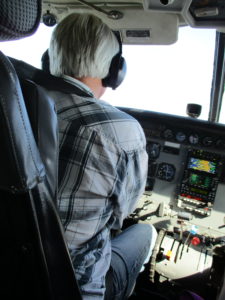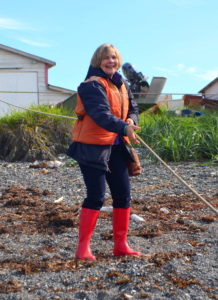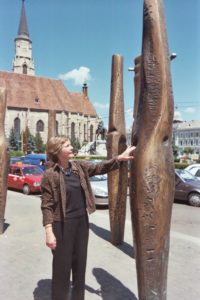After three decades of reading poetry and running workshops, I can tell you stories! These trips often surprise me and almost always make me feel grateful. Grateful especially for the people I meet. Each is part of the vast jig-saw puzzle of Community: what we must have, what we cannot do without. Then there are wild landscapes and events — like the episode with the drunken rat. The bush plane. The bulldog.
Trekking to Harvester Island, Alaska
We’re flying through a baby-blue, late-August sky. Gray clouds drift by like lazy whales. Eight of us hold our breaths as the plane shudders and bucks in the wind. Yesterday a plane flying this route went down. We’re headed for a remote fish camp to join The Harvester Island Wilderness Workshop. There trees bend arthritically and sea lions bask on rocks. There’s no TV, no grocery store, no flush toilets. So we talk metaphor, we write, we haul the skiff in on gnarled ropes. For dinner we chow down fresh-caught salmon. We live together this way with weather and words, grass and stillness for a week. When we fly out, we are changed.
Crossing 2 Borders to Romania
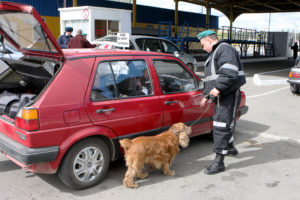 I fly with a dear friend to Vienna and then drive to Cluj, Romania, where we will keynote together at a conference. We don’t know these poets, except online. But Luci has hidden 200 sterile syringes in her suitcase for one of them, who says he must take a hepatitis shot every day. I’ve packed 15 pairs of jeans to give away because, word has it, Eastern Europeans love American jeans. As we drive across Austria we chirp happily. But at the border with Hungary, when we spot officers with guns, it dawns on us: they’ll find our stuff and slap us in jail. “Pretend you’re knitting,” I suggest to Luci, messing up my hair and kleenexing my lipstick off. I hope the cops will figure we’re too old, too used-up to pull anything risky. They sternly signal Stop! They lean into the car, take our passports, yank open our trunk, examine the spare tire, the bottled water, the blankets. They talk among themselves in their little house, stalk around the car, examining mirrors, fenders, windows. We sweat. We pray. Finally they wave us through without checking our suitcases.
I fly with a dear friend to Vienna and then drive to Cluj, Romania, where we will keynote together at a conference. We don’t know these poets, except online. But Luci has hidden 200 sterile syringes in her suitcase for one of them, who says he must take a hepatitis shot every day. I’ve packed 15 pairs of jeans to give away because, word has it, Eastern Europeans love American jeans. As we drive across Austria we chirp happily. But at the border with Hungary, when we spot officers with guns, it dawns on us: they’ll find our stuff and slap us in jail. “Pretend you’re knitting,” I suggest to Luci, messing up my hair and kleenexing my lipstick off. I hope the cops will figure we’re too old, too used-up to pull anything risky. They sternly signal Stop! They lean into the car, take our passports, yank open our trunk, examine the spare tire, the bottled water, the blankets. They talk among themselves in their little house, stalk around the car, examining mirrors, fenders, windows. We sweat. We pray. Finally they wave us through without checking our suitcases.
But the dreaded border crossing into Romania awaits us and we no longer laugh so often as we drive.
At the Conference we talk poetry with young Romanian poets. We drink champagne with Romania’s Culture Minister at the unveiling of the group’s latest anthology. And we tour the studio of the dashing sculptor, Liviu Mocan, whose statues in downtown Cluj memorialize the murder of the Cluj citizens who stood up to Ceausescu. When Luci and I get home, we sit—exhausted– at my dining room table translating, consulting dictionaries. We parry and thrust, come to joyous agreement about a poem, then struggle with another. All the poems we translate find homes in American journals. American readers begin to read and love Romanian poets.
Going Back to Kindergarten
We rocket from breakfast, clambering into to Toyota– lunch boxes? Yes. Homework? Check. Violins? Okay, then! At school we wave to Nancy, the Principal, who knows every child’s name. Soon I am reading to kindergartners from a raggedy book I received as a present when I was 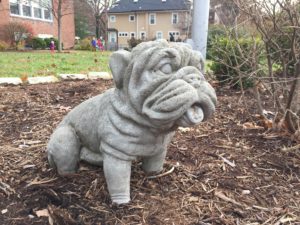 five. “Here’s my favorite,” I tell them: the Gingham Dog and the Calico Cat. They fight while their people sleep upstairs. The children sit spellbound. “The truth about the cat and pup,” I read, “Is this: they ate each other up!” A few children yell, “No!” Others shout, “Yes!” A debate breaks out. They wonder what I wondered a long time ago: could two stuffed animals actually eat each other up? As we leave Bistol, we walk by the school mascot, Buddy the Bulldog. I think I see him wink. Maybe he knows. Yes, I think, maybe the animals did eat each other up.
five. “Here’s my favorite,” I tell them: the Gingham Dog and the Calico Cat. They fight while their people sleep upstairs. The children sit spellbound. “The truth about the cat and pup,” I read, “Is this: they ate each other up!” A few children yell, “No!” Others shout, “Yes!” A debate breaks out. They wonder what I wondered a long time ago: could two stuffed animals actually eat each other up? As we leave Bistol, we walk by the school mascot, Buddy the Bulldog. I think I see him wink. Maybe he knows. Yes, I think, maybe the animals did eat each other up.
The Student Reading No One Will Attend
The student poets are not happy, not at all, but I insist that they line up, not virtually, but here in our classroom in the flesh, close so they can touch one another. I ask them to march to the front of the room the very way they will enter their final reading at Barnes and Noble. Each of them steps to the podium and reads her poem. They are embarrassed. I don’t care. I do a lot of readings and I know the value of rehearsal. What about that second line, Melissa? Your title, Sam, what does it mean? Maybe make that clearer to your audience?
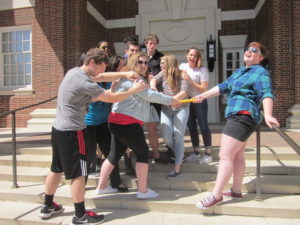 If there is an audience—that’s what we’re all thinking. My students have advertised their Reading! on Facebook. But who knows?
If there is an audience—that’s what we’re all thinking. My students have advertised their Reading! on Facebook. But who knows?
Here we are: this year’s Poetry Writing Workshop, heading toward the finish line, a reading at our local Barnes and Noble. No one, my students are sure, will show up to hear them. Who cares about poetry?
And, in fact, as we gather half an hour before the reading, all the seats in the cafe are empty. We talk to one another nervously without mentioning the problem. Then in the last minutes, friends, neighbors, parents flood in. Out of pure relief, one of my students buys me a last-minute latte. I sit, proud and astonished as my young friends, the poets, read their poems to almost a hundred people.
What Happens in the Faculty Dorm
Way early, too, too early in the morning Gina, our beloved fiction writer, knocks on our bedroom doors. She’s yelling. After 6 years of teaching together, I’ve never heard Gina raise her voice, but here she is at my door. “The wine box is moving!”
 We all lunge out to the tiny kitchen in our pajamas, where, indeed, the Franzia is slowly traveling on its shelf. And I think I hear a soft hiccough. A hairless tail appears, color of a rubber band. Then two shining black eyes, whiskers stained burgundy, a humiliated-looking rat the size of a woman’s sneaker. He edges out from behind the box. We leap, we shriek, moving towards hysteria. The charming villain blinks at us. Quickly we shove the sofas and chairs to form a chute. Braveheart Gina moves in with paper (maybe a short story by one of our students?) to fan the criminal down our shaft towards the door, which one of us has thoughtfully opened.
We all lunge out to the tiny kitchen in our pajamas, where, indeed, the Franzia is slowly traveling on its shelf. And I think I hear a soft hiccough. A hairless tail appears, color of a rubber band. Then two shining black eyes, whiskers stained burgundy, a humiliated-looking rat the size of a woman’s sneaker. He edges out from behind the box. We leap, we shriek, moving towards hysteria. The charming villain blinks at us. Quickly we shove the sofas and chairs to form a chute. Braveheart Gina moves in with paper (maybe a short story by one of our students?) to fan the criminal down our shaft towards the door, which one of us has thoughtfully opened.
In the years that have followed, rat-face has never visited us again. He’s morphed into a story we tell our students. I imagine him sometimes, as I walk to a poetry workshop, sitting in his burrow at St. John’s College in Santa Fe, telling his grandchildren, Never drink in a women’s dorm.
Watch this space for more stories. . . .

